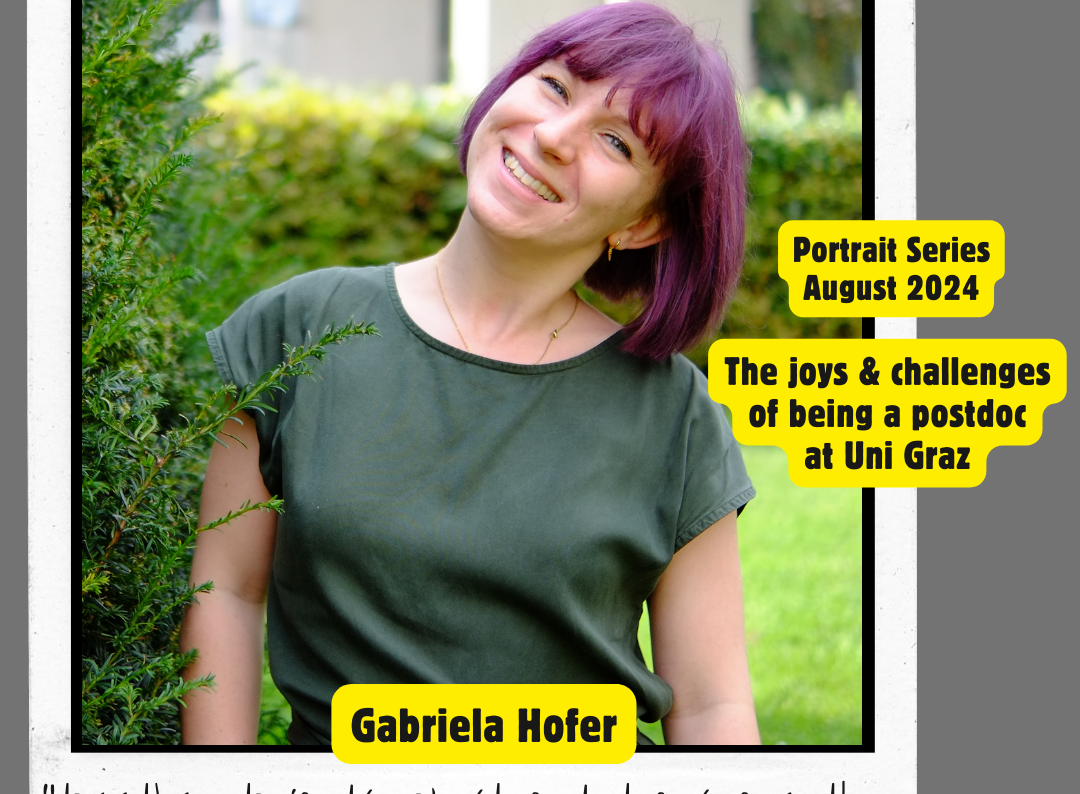This summer, you have the opportunity to get to know some of the brilliant postdoctoral researchers at our university. Our portrait series highlights the diversity within this group of University of Graz research talents - and obviously the fascinating research that they do. Here are four questions for…
Gabriela Hofer, Department of Psychology
1) Tell us a little about yourself, and your journey to become a researcher at Uni Graz.
My name is Gabriela Hofer. I am a psychologist and did my dissertation in differential psychology, a field in which we study how people differ from each other (e.g., in their personality or behavior). I remember already wanting to be a psychologist in kindergarten, in a quest to understand why people acted in certain ways but also to help those who struggle with psychological problems. At the beginning of my studies, my goal was to become a clinical psychologist or psychotherapist. But then I completed some smaller research projects as coursework and quickly became intrigued about solving puzzles about the human mind.
2) What are you currently researching, and why do you think it is important (or interesting)?
The short answer is: Too many things. I am curious about many research questions related to self-knowledge, gender, and social interactions. But here, I want to elaborate on one research focus of mine. In my doctoral research, I focused on self- and other-knowledge of different cognitive and non-cognitive abilities, trying to answer the question "Who knows what a person is good at?". Some of my current work is still in this area but focuses on gender differences. A lot of research found that women tend to think they have lower abilities than men do, even though there are hardly any differences between the two groups in objective measures of these abilities. In our current projects, we are researching whether these findings are due to women underestimating or men overestimating themselves. Our first findings suggest that the former might be the case. One area where these findings might be particularly important are career-related decisions: Women who underestimate their abilities might be reluctant to apply for studies or job positions they are actually very well suited for, which might be one of many factors explaining women’s underrepresentation in some jobs.
3) What gives you joy in your everyday work life & what are some challenges?
What I love about working at university is the large variety of tasks that comprise my work: There are phases, where I spend a lot of time preparing my teaching, giving courses, and talking to students—all of which I greatly enjoy. Other times are quieter and I have more time for research, meaning that I plan and implement psychological studies, analyze the resulting data, write up the results, and talk about them at international conferences.
I also love connecting to other researchers and working together to improve research systems. In 2011 (incidentally, the year that I began studying), psychology realized that many of our fundamental studies were not replicable. One reason for this lack of replicability is how research has been done and incentivized in the past. Specifically, many top-tier journals (i.e., journals whose names hiring committees like seeing in people’s CVs) have focused on flashy, unlikely findings instead of robust and transparently reported work—a problem that is unfortunately not only present in psychology. This has led to a movement towards more open research practices (sometimes called “open science movement” or “credibility revolution”). I only became aware of these problems during my Master’s degree (thanks to Hilmar Brohmer, who knew a lot about them). Soon after the beginning of my PhD, I and a couple of colleagues from different universities in Graz founded the Graz Open Science Initiative (GOSI) as a platform to talk about these issues and potential solutions that the different fields have come up with. We also have a monthly journal club (the ReproducibiliTea, an international early-career initiative). It is challenging to try to change the status quo but it is far more enjoyable to do it together with others than alone. And it is amazing to see how much has already changed for the better in the last couple of years.
4) What's next for you this year/next year?
During the summer, I will go to three conferences and an expert meeting on self-knowledge. I am already very much looking forward to chatting with my international colleagues about their work. I will also join the PostDoc Office Writing Retreat in September, which is highly necessary because I have to finish up a couple of writing projects. Research-wise, I will continue my self-knowledge- and gender-related work. I will also pursue my more recent research projects that focus on human sexuality and modern relationship models (both of which are unfortunately still highly under researched).
Questions: Johanna Stadlbauer, July 2024, Picture credit: Hofer/privat
P.S. You can read every portrait in this interview series with Uni Graz postdocs right now!
